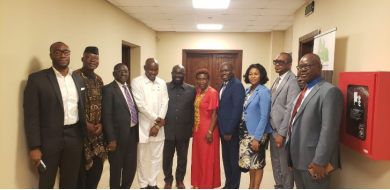Inside Boakai’s 80th UNGA speech
-The quest for Global Action on Climate Change, Debt Justice, and UN Reform.

Liberian President Joseph Nyuma Boakai, Sr., on Tuesday, September 23, 2025, urged world leaders to strengthen multilateral cooperation, confront urgent global crises, and support Liberia’s quest for justice and reconciliation through the establishment of a War and Economic Crimes Court.
Speaking under the theme “Better Together: 80 Years and More for Peace, Development, and Human Rights,” President Boakai reaffirmed Liberia’s historic role in the UN system, recalling that the country was among the first four African nations to sign the UN Charter in 1945. Eight decades later, he said, the world faces challenges ranging from wars and displacements to climate change and widening inequalities that demand collective solutions, not division.
“Reversal of multilateralism is not an option for a just and peaceful world,” Boakai declared, stressing that the credibility of the UN lies in its ability to act together in the service of humanity.
Boakai celebrated Liberia’s election to a non-permanent seat on the UN Security Council for the 2026–2027 term, the country’s first full tenure since signing the UN Charter. He pledged that Liberia’s representation will amplify Africa’s voice, calling for fair and permanent representation for the continent on the Council.
“While the nameplate during this two-year term will read ‘Liberia,’ the seat, however, belongs to Africa,” he said.
Peace, Diplomacy, and Global Conflicts
Drawing on Liberia’s painful legacy of civil war and hard-earned peace, Boakai reiterated his country’s commitment to diplomacy and dialogue. He voiced support for mediation in the Russia-Ukraine war and reaffirmed Africa’s standard position on the Israeli-Palestinian conflict, endorsing a two-state solution based on international law.
“Rising from the ruins of civil war, Liberia knows all too well the human cost of conflict and the importance of peace,” he told delegates, pointing to Liberia’s three successive peaceful democratic transitions since 2003.
Turning to climate change, the Liberian leader described it as an existential threat that is already devastating his country through coastal erosion, heavy rainfall, and food insecurity. He outlined Liberia’s ongoing adaptation strategies, including coastal defense projects, carbon market policies, and a blue economy strategy, but stressed that national efforts alone are insufficient.
“Those who contribute the least to this crisis should not be forced to suffer the most,” Boakai argued, demanding urgent global action on the Paris Agreement, full capitalization of the Loss and Damage Fund, and climate justice for vulnerable nations.
He also joined other developing nations in calling for reforms to the international financial system, condemning the burden of unsustainable debt servicing that undermines investment in health, education, and development.
Boakai highlighted Liberia’s ARREST Agenda for Inclusive Development, which prioritizes Agriculture, Roads, Rule of Law, Education, Sanitation, and Tourism/Technology as the cornerstone of national progress. He stated that the agenda aligns with Liberia’s Vision 2030, which aims to transition the country to a lower-middle-income status while reducing inequality and strengthening governance through accountability and anti-corruption reforms.
In one of the most significant portions of his address, President Boakai renewed Liberia’s appeal for international support to establish a War and Economic Crimes Court.
“These are essential steps toward achieving lasting peace and genuine national healing,” he said, adding that memorializing victims and upholding justice remain critical to reconciliation after Liberia’s brutal civil conflict.
Boakai endorsed the Pact for the Future and the Global Digital Compact, while urging the UN to modernize its structures to reflect today’s realities. He warned against using “outdated 1945 solutions to tackle 2025 challenges.”
He also called for urgent acceleration of the Sustainable Development Goals (SDGs), framing their achievement as a “global emergency.” Liberia, he announced, will submit its next Voluntary National Review in 2026, aligned with Africa’s Agenda 2063 and ECOWAS’ Vision 2050.
Closing his address, President Boakai reaffirmed Liberia’s commitment to serving as a “bridge to peace, a development partner, and a defender of human rights.”
“Over the next 80 years, we will continue to honor the promise of 1945 by renewing our commitment to a world where peace is just, development is inclusive, and dignity is universal,” he concluded to applause.- Edited by Othello B. Garblah.



















